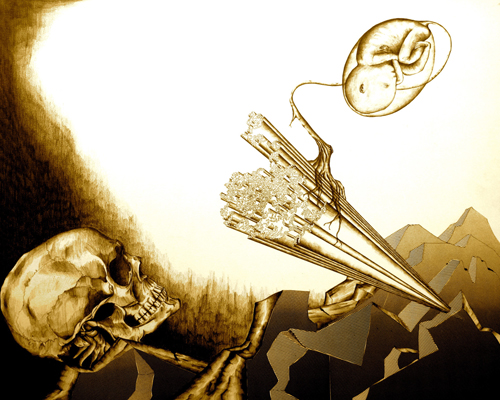
Your complimentary articles
You’ve read one of your four complimentary articles for this month.
You can read four articles free per month. To have complete access to the thousands of philosophy articles on this site, please
Books
Philosophical Posthumanism by Francesca Ferrando
Roberto Manzocco explores the posthuman condition.
To talk about posthumanism we have to go back to a relatively distant past – to the philosophical rift that separated the analytical philosophy of the Anglo-American tradition from the Continental one that has dominated the philosophical culture of Europe. In its constant deconstruction of the basic assumptions of mainstream Western philosophy (from Plato to the 19th Century), modern Continental thinking takes its main inspiration from Nietzsche. From Nietzsche onwards, it has focused on dismantling God, the subject, objectivity or truth, and rationality, in a process of nihilist liquefaction. And although some have tried to counter this process, many more others have decided to adopt the opposite strategy – that is, to accept and indeed try to ‘inhabit’ this nihilistic condition. Philosophical posthumanism can be considered part of this wide philosophical current.
As a term, ‘posthumanism’ was born within Literary Theory, specifically through a now famous 1977 essay by Ihab Hassan, ‘Prometheus as Performer: Toward a Posthumanist Culture?’ Philosophical posthumanism is an articulated or variegated movement that aims to continue the process of dethroning the human subject begun precisely with the three ‘masters of suspicion’ – Nietzsche, Marx, and Freud.
One of the central premises of this decentering of human subjectivity, is that humanity is only one species among many. From this it follows that the human perspective on reality is just one of the possible perspectives of the many species that co-inhabit our planet. Essentially, humanity is seen as a species among others, without a particular cognitive primacy. The accusation raised by posthumanists against the contemporary cultural milieu (an accusation which, ironically, has found traction in popular culture), is that of ‘anthropocentrism’ or humancentredness, an ‘original sin’ that may or may not be rectifiable. Posthumanism is an attempt to escape the constraints of the human condition; not in order to abandon the human gaze, but rather to be inclusive toward non-human viewpoints. It traces the limits of human thought and knowledge, while at the same time trying to capture the cognitive panorama beyond the human horizon. In short, it attempts to see things from a non-human viewpoint. This is an unknown (and largely unknowable) landscape.

Humanity: Life & Death. Past & Future © Paul Gregory
Several contemporary thinkers belong to this movement. Philosophers of posthumanism include Donna Haraway, Katherine Hayles, Stefan Lorenz Sorgner, David Roden, and of course, Francesca Ferrando. In her recent erudite compendium Philosophical Posthumanism (2019), Ferrando offers a review of the posthumanist movement, of its philosophical underpinnings, and of its relations with other movements, including transhumanism. Indeed, Ferrando argues that transhumanism is a manifestation of posthumanist philosophy.
Transhumanism is a political, cultural and philosophical movement that aims to overcome the limits of the human condition. The transhumanists’ objectives are to live longer, overcome our current cognitive limitations, even to improve our bodies in new ways, using technologies which are still in the early stage of development, or yet to be invented. We could define transhumanism as an ideology; but transhumanism possesses a peculiar characteristic that separates it from other ideologies: its flexibility. It is compatible with any other ideology or philosophy willing to accept its fundamental premise – that modifying the human organism through technology is a good idea. We find transhumanists who define themselves as Marxists, liberals, libertarians, even Christians. Posthumanism itself shares many concepts with transhumanism, including the ideas of the ‘cyborg’, ‘morphological freedom’ (the right to change body shape to our liking), ‘self-directed evolution’, and much more.
Philosophical Posthumanism contains a series of original reflections which will not fail to stimulate robust discussion. In particular, Ferrando discusses the role that technology has played in defining what ‘human’ and ‘posthuman’ mean, and how the human subject is shaped by the technology it uses (especially in reference to Michel Foucault’s concept of ‘Technologies of Self’). Particularly interesting to me was Ferrando’s reflection on ‘The Epiphany of Becoming Human’, which does not neglect to mention the famous ‘Overview Effect’, the radical psychological change many astronauts underwent after observing the Earth literally from the outside.
Ferrando does not stop at the edge of space, but builds an ontology of the posthuman that embraces the whole of reality, extending posthumanism’s scope to the entire universe, and indeed, to all possible universes. In the final part of her text, Ferrando analyzes the fascinating and controversial notion of the multiverse. Here she applies posthumanist thought to question whether, in imagining other universes, we do not in some way color them with our anthropocentric prejudice.
© Roberto Manzocco 2020
Roberto Manzocco is an Italian author, journalist, and historian of science who specializes in the history and philosophy of biology, technological innovation, and technological forecasting.
• Philosophical Posthumanism, Francesca Ferrando, Bloomsbury, $82 hb, 296 pages, ISBN: 9781350059498









